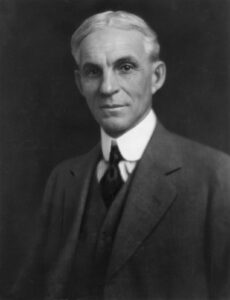Ford Motor Company (commonly known as Ford) is an American multinational automaker headquartered in Dearborn, Michigan, United States. It was founded by Henry Ford and incorporated on June 16, 1903. The company sells automobiles and commercial vehicles under the Ford brand, and luxury cars under its Lincoln brand. Ford also owns a 32% stake in China’s Jiangling Motors. It also has joint ventures in China (Changan Ford), Taiwan (Ford Lio Ho), Thailand (AutoAlliance Thailand), and Turkey (Ford Otosan).

Ford is the second-largest U.S.-based automaker (behind General Motors) and the sixth-largest in the world (behind Toyota, Volkswagen Group, Hyundai Motor Group, Stellantis, and General Motors) based on 2022 vehicle production. At the end of 2010, Ford was the fifth-largest automaker in Europe. The company went public in 1956 but the Ford family, through special Class B shares, still retain 40 percent of the voting rights. During the financial crisis of 2007–08, the company struggled financially but did not have to be rescued by the federal government, unlike the other two major US automakers.
Ford’s most famous product is the Model T, which was introduced in 1908. The Model T was the first automobile that was affordable for the average person, and it helped to revolutionize transportation in the United States. Ford also produced a number of other popular cars, including the Mustang, the F-150, and the Explorer.
Ford is a major player in the global automotive industry. The company’s products are sold in over 200 countries, and it employs over 200,000 people worldwide. Ford is also a major investor in research and development, and it is constantly developing new technologies for its vehicles.
Ford is a well-respected company with a long history of innovation. The company has a strong commitment to quality, and it is known for its reliable and durable vehicles. Ford is also a major employer, and it offers a wide range of career opportunities.
Success Factors of Ford Motors
Ford Motor Company has achieved enduring success in the automotive industry. Ford’s journey to prominence can be attributed to several key success factors that have shaped its brand, products, and market leadership. Let’s delve into the details of these success factors:
Product Innovation and Design: Ford’s commitment to product innovation and design excellence has been a driving force behind its success. The company has consistently introduced groundbreaking technologies and design advancements that have revolutionized the automotive industry. Ford’s focus on innovation spans various areas, including fuel efficiency, safety features, connectivity, and electric vehicle technology. Notable examples include the introduction of the Model T, the first affordable mass-produced automobile, and the development of advanced safety systems such as the Ford Co-Pilot360™ suite. Ford’s relentless pursuit of product excellence has established it as an industry leader and a symbol of automotive innovation.
Strong Brand Identity and Heritage: Ford has built a strong brand identity over its long-standing history, leveraging its rich heritage and reputation for quality, reliability, and performance. The Ford logo has become synonymous with American automotive craftsmanship and engineering. The brand’s commitment to creating vehicles that resonate with consumers’ aspirations and lifestyles has solidified its position in the market. Ford’s strong brand recognition, coupled with its deep-rooted heritage, fosters brand loyalty and drives customer preference for its products.
Global Manufacturing and Supply Chain: Ford’s success can be attributed to its robust manufacturing capabilities and efficient supply chain management. The company operates manufacturing facilities worldwide, enabling it to produce vehicles tailored to specific regional markets and respond to changing customer demands effectively. Ford’s global manufacturing presence allows it to optimize production processes, control costs, and deliver vehicles in a timely manner, ensuring customer satisfaction. The company’s supply chain management ensures the availability of components and parts required for efficient production, further contributing to its operational efficiency and market success.
Marketing and Branding Strategies: Ford’s marketing and branding strategies have played a vital role in its success. The company has effectively communicated its brand values, product features, and customer benefits through comprehensive marketing campaigns. Ford’s marketing initiatives emphasize its commitment to quality, innovation, and customer-centric solutions. The brand’s advertising campaigns often highlight the durability, performance, and cutting-edge features of its vehicles, resonating with target consumers and driving brand preference. Additionally, Ford’s involvement in motorsports, such as NASCAR and the Le Mans 24 Hours, enhances its brand image and reinforces its reputation for performance and engineering excellence.
Embracing Sustainability and Electric Mobility: Ford’s commitment to sustainability and electric mobility has become a significant success factor in recent years. The company has made substantial investments in electric vehicle technology, aiming to create a cleaner and more sustainable future. Ford’s introduction of all-electric and hybrid models, such as the Ford Mustang Mach-E and the Ford F-150 Lightning, reflects its dedication to environmental responsibility and aligns with shifting consumer preferences. By embracing sustainable practices and offering eco-friendly transportation solutions, Ford has positioned itself as a forward-thinking and socially responsible brand.
Customer Focus and Innovation Adoption: Ford’s success is rooted in its customer-centric approach and willingness to embrace innovation. The company continuously listens to customer feedback and adapts its products and services to meet evolving needs and preferences. By leveraging emerging technologies and trends, such as connectivity, autonomous driving, and mobility services, Ford aims to enhance the overall customer experience and provide innovative solutions that go beyond traditional vehicle ownership. Ford’s focus on customer satisfaction and its willingness to embrace change enable the company to stay ahead of the curve and remain competitive in a rapidly evolving industry.
Ford’s enduring success is attributed to a combination of factors, including product innovation, strong brand identity, global manufacturing capabilities, effective marketing strategies, sustainability initiatives, and customer-centricity. By consistently delivering innovative products, embracing change, and aligning with customer expectations, Ford has established itself as a leader in the automotive industry. As the company continues to evolve and adapt to emerging trends, Ford’s commitment to excellence, sustainability, and customer satisfaction will continue to drive its success in the global marketplace.
Also Read: The Legacy of Innovation: A Comprehensive History of Ford Motors
To read more content like this, subscribe to our newsletter



